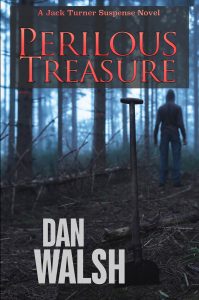by Dan Walsh, @DanWalshAuthor
In last month’s column, I talked about how Great Endings help sell more books (and why this is so). I only had time (at the end) to share one tip, which was: Unless your next book comes out in a month, avoid cliff-hanger endings.” Most readers can’t stand them endings. Why? Because it leaves them…hanging.
When watching a TV show where the next episode runs in a week (or binging an entire series on cable over a few days), cliff-hanger endings aren’t so bad. The wait is either fairly short or—in the case of binging—there’s no wait at all. But even the most prolific authors need a few months to craft a well-written novel (I need 4-6). Some writers only put out a new book once a year.
That’s WAY too long to make a reader wait to find out how the story ends. Instead of feeling happy and satisfied, they feel frustrated and ripped off. Not the kind of attitude likely to encourage them to leave a good review or sign up for your newsletter. Some readers may be frustrated enough to leave a bad review (warning other readers about your lousy ending).
If you’re writing a series, it’s perfectly fine near the end to introduce some light foreshadowing of possible things to come in your next book, but these should be subtle hints at best. Your ending needs to be the climax of your story. It’s when the guy gets the girl, the runner wins the race, the crime gets solved, the bad guy gets it, the world gets saved. Which means…at the end, all the major conflicts and questions we’ve introduced get resolved.
I’ve spent the last 3 years writing 2 separate book series (one with 4 books, the other with 3). My goal for each of these books is to be able to say: “Can easily be read as a Stand-alone.” Even so, each of these books sets up the next without leaving the reader hanging in mid-air.
Here’s my 2nd Great Ending Tip: Avoid the Overly Predictable Ending.
Most readers prefer the opposite of this. They love it when an author surprises them with a twist ending they didn’t see coming (as long as it works). In some genres, like a murder mystery, a surprise ending is almost a requirement. Mystery writers really need to master this skill to gain a solid readership.
In other genres, like Romance or Romantic Suspense, we pretty much know the boy gets the girl in the end. The surprise or twist can be in the way this finally happens. Keep putting off that delightful moment or make it seem as though maybe it’s not going to happen this time. Or, keep the reader guessing till the end about how it all works out.
If writing historical fiction, the ending has to go a certain way. In a Civil War novel, the North wins. In a Titanic story, the ship sinks. While we can’t change history, there’s nothing saying how our fictional characters are going to handle or react to the historical situation. We can keep the reader guessing (and worrying about it) till the end. In the Titanic movie, poor Jack freezes to death saving Rose. But now, Rose gets to live a brand new life freed from her tyrannical mother and fiancé. Her “heart will go on and on.”
We’ll end with my 3rd Great Ending Tip: Avoid the Rushed or Forced Ending.
This is an ending where the reader feels the author didn’t take enough time to wrap things up. The Big Conflicts may be resolved, but many of the smaller or medium-sized ones are left unanswered. Or, you force a bunch of things to happen artificially at the end (things that would never happen in real life).
Maybe you’ve got a looming deadline and don’t have time to “craft the perfect ending.” Or you’re up against a hard word-count boundary and running out of room. Maybe you’ve been working on this book so long, you’re sick of it and just want the story to end.
Whatever the case, don’t do it! Don’t rush the ending. You’ve taken the reader on this long journey spanning several hundred pages, don’t abandon them at the end. If you need to take a break to recharge your batteries, then do it. Come back when you’re refreshed and write the ending the way it’s supposed be, taking as much time as you need to do it right.
I believe we should spend as much time unwinding the ending as we did building suspense for our story in the beginning.
Next month, we’ll finish up this theme looking at the issue of Happy Endings.
 Young history Professor Jack Turner is settling into his new position at Culpepper University, when he gets a surprise visit from his friend, police Sgt. Joe Boyd. Joe has started a new hobby, a fun pastime that’s also helping him lose some weight — metal detecting. Joe asks if he can do this on Jack’s lakefront property, which includes over a dozen acres of woods. Intrigued by a hobby that combines physical exercise and Jack’s love of history, Jack asks to tag along. Neither man has any idea that this seemingly harmless hobby will cause their paths to cross with a 70-year-old mystery involving tragedy, smuggling, multiple murders and stolen Nazi loot. It’s just an innocent hobby Jack tells his wife, Rachel. Really, what could go wrong?
Young history Professor Jack Turner is settling into his new position at Culpepper University, when he gets a surprise visit from his friend, police Sgt. Joe Boyd. Joe has started a new hobby, a fun pastime that’s also helping him lose some weight — metal detecting. Joe asks if he can do this on Jack’s lakefront property, which includes over a dozen acres of woods. Intrigued by a hobby that combines physical exercise and Jack’s love of history, Jack asks to tag along. Neither man has any idea that this seemingly harmless hobby will cause their paths to cross with a 70-year-old mystery involving tragedy, smuggling, multiple murders and stolen Nazi loot. It’s just an innocent hobby Jack tells his wife, Rachel. Really, what could go wrong?
 Dan Walsh is the bestselling author of 20 novels including The Unfinished Gift, The Reunion and When Night Comes. He has won 3 Carol Awards (finalist 6 times), 4 Selah Awards (finalist 5 times), and 4 of his books have been finalists for RT Review’s Inspirational Book of the Year. A member of American Christian Fiction Writers (ACFW) and Word Weavers International, Dan writes fulltime in the Daytona Beach area. He and his wife Cindi have been married 42 years, have 2 children and 4 grandchildren. You can find out more about Dan’s books or follow him on Facebook, Twitter, Goodreads or Pinterest from his website at http://www.danwalshbooks.com.
Dan Walsh is the bestselling author of 20 novels including The Unfinished Gift, The Reunion and When Night Comes. He has won 3 Carol Awards (finalist 6 times), 4 Selah Awards (finalist 5 times), and 4 of his books have been finalists for RT Review’s Inspirational Book of the Year. A member of American Christian Fiction Writers (ACFW) and Word Weavers International, Dan writes fulltime in the Daytona Beach area. He and his wife Cindi have been married 42 years, have 2 children and 4 grandchildren. You can find out more about Dan’s books or follow him on Facebook, Twitter, Goodreads or Pinterest from his website at http://www.danwalshbooks.com.

